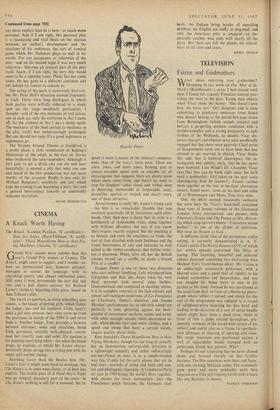CINEMA
A Knack Worth Having The Knack. (London Pavilion, 'X' certificate.)— Baie des Anges. (Paris-Pullman, 'A' certifi- cate.)---Those Magnificent Men in their Fly- ing Machines. (Astoria, 'U' certificate.) .GRAND Prix' sounds more solemn than this year's Grand Prix winner at Cannes, The Knack, might seem to suggest; and I wonder too how an international jury, however polyglot, managed to savour the language, with its anarchical poetry and almost subliminal jokes. Still, since it won, presumably the jury did, and two and a half cheers anyway for Richard Lester's feathery, beguiling little piece, based on Ann Jellicoe's play. The knack in question, as every schoolboy now knows, is the knack of getting girls, which Tolen, the lodger, has and his landlord, Colin, hasn't; until a girl who reverses their roles turns up from the provinces in search of the YWCA and never finds it. Another lodger, Tom, provides a balance between extremes, sexes and situations, being Irish, garrulous, sexually well-adjusted, overtly mad but covertly sane and solid. His passion is for painting everything white—for when the bomb drops, he explains, at which Mr. Lester charac- teristically plops an egg into a frying pan with his usual split-second timing. Anything faster than the Beatles film (Mr. Lester's last) it might seem hard to envisage; but The Knack is in some ways faster, or at least less explicit. The frantic pace of A Hard Day's Night was an integral, necessary part of the story—in The Knack nothing is still for a moment, but its
Harold Pinter
speed is more a matter of the director's tempera- ment than of the story's basic pace. There are jokes, jokes, and more jokes, flashing past at almost missable speed with an amiable air of extravagance that suggests there are plenty more where those came from, and there's no need to stop for laughter—jokes visual and verbal, deep or fluttering, memorable or forgettable, zany, dreamlike, spotted or striped, and nearly every one of them attractive. Attractiveness is really Mr. Lester's trump card —his film is so remarkably likeable that you overlook practically all its limitations until after- wards. Only then does it dawn that its style is a hotchpotch of fashionable tricks, slung together with brilliant effrontery but not, if you know their origins, exactly original. But the pinchiiig is so blatant and even the smartness so fresh, the cast of four directed with such liveliness and the visual bizarreness of sets and fantasies so well suited to the verbal acrobatics, that heftier critic- ism is disarmed. When, after all, has the British cinema turned out a soufflé, let alone a Grand Prix of a soufflé? Jacques Demy is one of those rare directors who start without fumbling. Lola introduced him full-grown and Baie des Armes takes his very fluid, personal style several steps further. Diamond-hard and composed in dazzling whites, it is in complete contrast to the lush colours and almost self-indulgent tenderness of Les Parapluies de Cherbourg. Demy's direction and Jeanne Moreau's performance (as an old-style vamp) are perfectly in tune, glittering against the back- ground of stereotyped seashore, casino and hotel; with white sunlight outside, white decoration in- side, white-blonde hair and white clothes, and a speed and sweep that have a certain stately, elegiac quality about them. Ken Annakin's Those Magnificent Men in their Flying Machines, though far too long (it actually has an Intermission, unforgivable intrusion in a lightweight comedy), and rather suffocatingly pre-war-Punch in tone, is in a simple-minded way fun, if only for the early planes that are its real stars—marvels of string and faith and can- vas and photogenic ingenuity. A London-to-Paris air race in 1910 brings the world's fliers together, with excuse for every nationalistic joke—the Frenchmen pinch bottoms, the Germans click heels, the Italians bring hordes of squealing children, the English are stuffy or dog-mad, and only the American pilot is unguyed—an im- peccable cowboy who ends with nearly all the glory. But there are still the planes, for school- boys of all sizes and sexes.
ISABEL QUIGLY


































 Previous page
Previous page